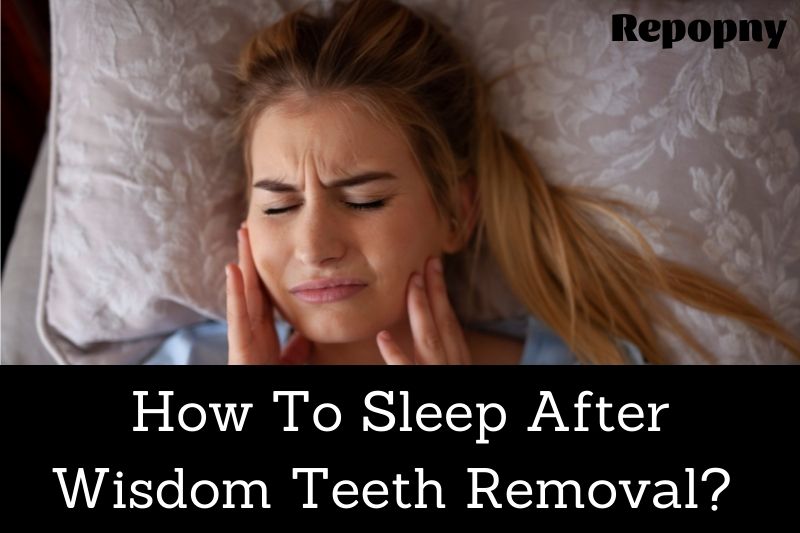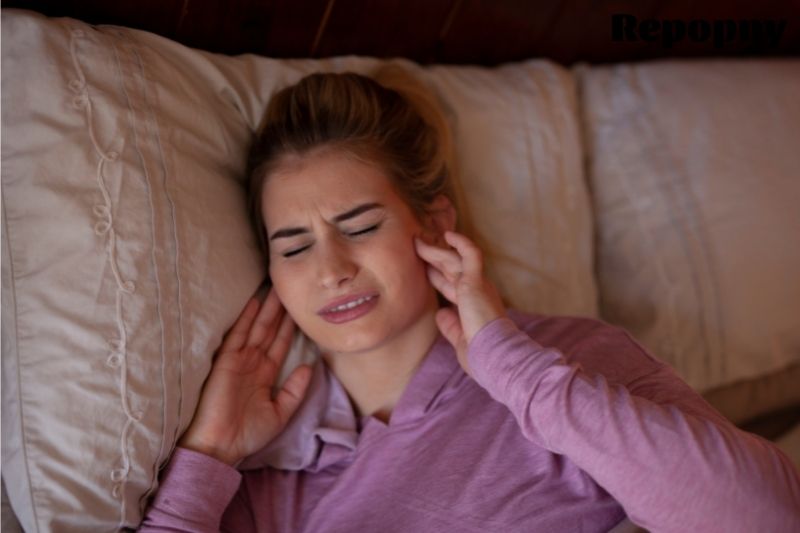Wisdom teeth removal can be a painful experience, but there are ways to get some relief and get a good night’s sleep. In this article, Repopny will provide a few tips on how to sleep after wisdom teeth removal.
Wisdom Teeth Extraction
Almost 85% of Americans will need their wisdom teeth extracted at some point, and we’re envious of those who won’t have to go through the process. Although it is a straightforward outpatient procedure, the recovery period might be lengthy. It can be even more difficult if you cannot get a good night’s sleep.
Because sleep is such an essential part of rehabilitation, it’s easy to see how this situation can quickly spin out of control if you don’t receive enough of it. The less sleep you receive, the more painful the healing process becomes, making it much more difficult to sleep – and so on.
Carla, a member of the Slumber Yard team, just had her wisdom teeth extracted. She had to say about her sleep after the procedure when we asked her about it.
“Be ready to change your eating habits because you can only eat liquids and soft things like yogurt and pudding.” I avoided noodle soup after getting a noodle jammed in the holes where my wisdom teeth were. Your sleep schedule may be disrupted due to your new eating habits.
I experienced a migraine after the surgery and an aching jaw for the first couple of days, which made falling asleep more difficult. But I did take a lot of naps the first two days.
Over the days, I’d guess I got approximately the necessary six to eight hours of sleep. Others have told me they’ve slept more, especially if your dentist puts you on more potent pain relievers than Tylenol. It was also painful to yawn for approximately a month, so be prepared.”
The majority of people will have to have their wisdom teeth removed at some point. While everyone’s experience is unique, you may anticipate a few things following wisdom tooth removal. This book will teach you some basic strategies and provide you with expert advice on how to speed up your recovery and get better sleep.
How to Sleep Post Teeth Removal
Take Your Pain Medication
You may experience pain when your anesthetic wears off, and any discomfort can make it difficult to fall asleep. Don’t try to push through. Instead, take your pain medication as suggested by your oral surgeon to ensure a restful night’s sleep.
Select The Correct Position
The tooth extraction site may ooze in the early stages of healing. As a result, sleeping on your side is preferable, at least the first night. Furthermore, lying flat on your back may cause further swelling. This could aggravate your pain and make relaxing even more difficult.
Raise Your Head
You should sleep with your head up for the first few nights after wisdom tooth extraction. When sleeping on your side, a single pillow should be enough. If you’re having problems sleeping in that position, lean back and pile a few pillows behind you for support.
Follow Your Aftercare Instructions
Pay heed to your oral surgeon’s aftercare recommendations for the best possibility of napping the night away in comfort. You’ll have a smoother and simpler recovery if you take good care of yourself while recuperating from wisdom teeth extraction.
Follow these steps to set the stage for a restful night’s sleep:
- Apply ice and heat as suggested until you are ready to retire to your bed.
- Limit your physical activities as much as possible.
- Keep hydrated, but avoid drinking through a straw.
- Don’t use tobacco in any form, including cigarettes.
- Before going to bed, satiate your hunger with milk, fruit smoothies, low-sodium soup, or nutritional supplement liquids.
Additional suggestions from your oral surgeon are possible. If you follow their recommendations, you should have no trouble sleeping after removing your wisdom teeth.
If you live in Wayne Township, Wayne County, or the neighboring east-central Indiana area and have concerns regarding wisdom teeth extraction, schedule an appointment with Richmond Oral & Maxillofacial Surgery.
Dr. Partridge and Dr. Alderman are wisdom tooth extraction specialists with years of expertise guiding patients through the procedure.
The oral and maxillofacial surgery experts in Richmond can answer your questions, address your worries, and provide experienced advice on how to have a successful recovery. Please make an appointment with us now to discuss wisdom tooth removal.
Defending Against the Aftereffects of Wisdom Teeth Removal
Some frequent symptoms may develop after a wisdom tooth is extracted. These are the most prevalent symptoms, and medical advice from Mayo Clinic on managing them.
- Pain: You might get a prescription from your doctor to help you manage your pain. A cold pack and over-the-counter pain medicine, such as Tylenol, are also recommended by Mayo Clinic to control your pain.
- Bleeding: Some bleeding and seeping from the wound site are expected. Avoid excessive spitting and use gauze to shield the extraction site and blood clots to minimize bleeding.
- Swelling and bruising: Applying an ice pack to any swelling or bruising is a rapid fix. Swelling usually lasts a few days, but bruising can take up to a week.
- Nausea: If you feel queasy after your surgery, drink some ginger ale and rest for a few minutes to allow your body to recharge and recuperate.
It’s crucial not to brush your teeth, rinse your mouth, or use mouthwash for the first 24 hours after your procedure. When brushing again, rinse with warm salt water every two hours and brush with caution.
Smoking should be avoided for at least 72 hours after surgery, but preferably longer. To avoid interfering with the natural healing process, patients should refrain from chewing tobacco for at least one week.
If you suffer any of the following symptoms, consult your doctor right away:
- Having difficulty swallowing
- Breathing problems
- a lot of blood
- Severe discomfort
- Fever
- Excessive edema that persists for two or more days
- Pus in the socket or around it
- Feelings of numbness or loss of sensation
- Nasal discharge with blood or pus
Is It Necessary To Sleep With Gauze After Wisdom Teeth Extraction?
The function of gauze is to aid in the clotting of your wound by giving light pressure to it. Can you sleep with gauze in your mouth? It’s never a good idea to sleep with gauze in your mouth because it can cause choking.
When you’re lying down with gauze in your mouth, it’s essential not to fall asleep, especially if you’re taking drowsiness medications.
What To Do The First Few Days After Wisdom Tooth Extraction When You Wake Up?
A wisdom tooth extraction might take weeks to heal fully, but taking proper care of your wounds can help you recover faster. Some morning routines that may be beneficial include:
- Take any medication that your doctor has recommended.
- examining for symptoms of infection or other problems
- Use an ice pack or frozen vegetables wrapped in a towel to cool your face.
- Rinse your mouth gently with an antiseptic mouthwash after the first 24 hours to help destroy bacteria that can cause infection.
- Breakfast should consist of soft meals such as eggs and smoothies that will not aggravate your wounds.
FAQs
Is it safe to sleep on my side after wisdom tooth extraction?
After the wisdom teeth removal, you should avoid sleeping on your side for a few days. To keep the bleeding under control, it’s best to sleep upright. To prevent swelling and bleeding, keep your head elevated.
How long do I have to sleep with my head elevated/sit up following wisdom tooth extraction?
The first and second days after surgery should be spent sleeping on your stomach. Sleep with your head raised for at least 72 hours or until the bleeding has stopped.
Related Post:
Conclusion
Sleeping after wisdom teeth removal may not be easy for some, but there are ways to take care of yourself and get a good night’s sleep. Hopefully, these tips can help you find a better way to sleep.




